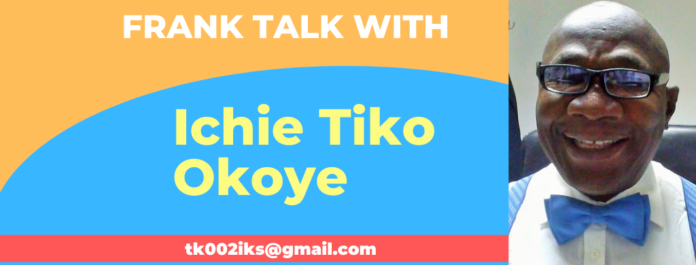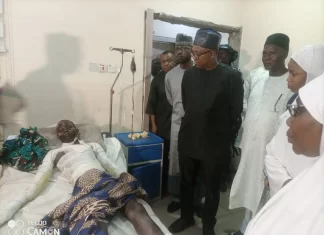The way things currently stand – and would most likely remain in the near future – unless a miracle occurs that propels Atiku’s newly-found hatred for Tinubu over and above his long-held quest to be president – and he agrees to immediately retire from partisan politics – the PDP not only runs the risk of imploding within 12-18 months, but would be in no position to lead other main opposition parties to act in any manner that poses a real electoral challenge to the APC.
By Tiko Okoye
A Daniel come to judgement! Yea, a Daniel! O wise young judge, how I do honour thee!
The foregoing exclamatory phrase was coined by William Shakespeare in his classic novel titled ‘The Merchant of Venice,’ by way of an allusion to the Biblical character Daniel, who was renowned as “a wise judge” having excellent faculties of judgement. In the scene at a Venetian court, Shylock – portrayed as a Jewish moneylender – was dead set on preventing Bassanio from saving Antonio, thereby denying him his pound of the latter’s flesh.
Jessica, Shylock’s daughter, had eloped with Lorenzo – a penniless Christian – and a chest of her father’s money, with the couple eventually seeking refuge in Portia and Bassanio’s household. Thus when Portia – disguised as the young Doctor Balthasar – delivered a summary judgement that seemed to favour him, Shylock delightfully dubbed ‘him’ a wise young judge worthy of honour.
Now fast-forward to the scene where the presidential candidate of the Peoples Democratic Party (PDP) made a little-appreciated but nevertheless earth-shaking concession in a speech urging opposition parties to merge if the ruling All Progressives Congress (APC) is to be toppled from power in 2027. It was indeed a Perry Mason moment; a point when information is unexpectedly, and often dramatically, introduced that changes the perception of the proceedings greatly and often influences the outcome of a dispute.
In the case of Shylock, the ‘Perry Mason moment’ came at the point when the judge, while granting Shylock’s prayer to receive a pound of Antonio’s flesh, ruled that his blood was excluded since it didn’t constitute ‘flesh.’ Talk of cutting flesh without spilling as little as one drop of blood!
By being able to wisely resolve a particularly difficult electoral problem or dispute that honestly was no more than just a storm in a teacup, when parties with access to the social media chose to designate an impending judicial decision as the Rubicon, Atiku transformed into a most unlikely Daniel come to judgement!
Unlike Shylock, it may be asking for too much to expect Atiku to profess his ‘honour’ of the not-too-young Supreme Court justices who presided over his case or the INEC chairman who adjudged Tinubu to have satisfied all eligibility requirements. Still, there can be no gainsaying that he finally made the mother of all confessions, to wit the opposition was indeed too splintered and fractionated to pose any real challenge to a united and behemoth APC, despite all the huffing, puffing, orchestrated campaigns of judiciary blackmail and intimidation as well as legal pyrotechnics. A Daniel similarly finally came to judgement!
To be fair to Atiku, quite unlike Peter Obi of the Labour Party (LP), he has never claimed to have won the presidential election. Atiku’s stance could be surmised as follows: “I recognize that Tinubu won the election that he wasn’t qualified to contest in the first place. He should be disqualified and his votes expunged from the records, thus enabling me, as the candidate with the highest number and compliant spread of valid votes, to be declared the winner.”
I’ve told my friends on numerous occasions that inasmuch as Tinubu is the most capable man for the job among the four frontrunners, in my candid assessment, I cannot vouch that he is innocent of the offences enunciated by Atiku in his petition for two principal reasons:
First, anyone resident in the USA between the late-1970s and mid-1980s knew that the trafficking of drugs through courier companies – particularly in hollowed-out bibles! – was rising by leaps and bounds. Whether it was by consensual agreement or just the product of a random event, the Yoruba seemed to dominate the illicit drug trade and credit card fraud business while Ndigbo dominated the Medicaid, Medicare and insurance frauds. Can it be taken that yours truly was also an active participant in order to be privy to such ‘highly confidential’ information? Not at all!
READ ALSO: Joseph Schumpeter: The illuminator of modernity
I was well ensconced in upscale upper-Manhattan while with the then-third largest global bank on Wall Street but I knew many Nigerians who were actively involved. As a matter of fact, a couple of them sought to temporarily chill in my apartment while on the run from agents of the DEA and/or FBI, as the case may be.
Second, our elders say that if a crying child keeps pointing in a particular direction, either of his father or mother or both must be holed up there. The tenacity and savagery with which Atiku went about his suits in the US courts indicated that he was very privileged to topmost confidential secrets that only Tinubu could’ve divulged to him while they were inseparable mentees of late Gen. Shehu Musa Yar’Adua in the Peoples Democratic Movement (PDM).
In cryptically positing that ‘it is what it is’ and that it was curiosity that got the cat killed, let’s simply give thanks to God that the entire saga mercifully came to a screeching halt before the fallouts could place the careers and lives of millions of Nigerian families in the USA in real jeopardy.
Truth’s that there are two principal ways in which most undocumented Nigerians acquire either the ‘green card’ or citizenship: military service or the other ways. The former is highly risky considering the ubiquitous presence of the US military in many global hotspots, hence a preponderant number resort to ‘the other ways.’
While Atiku’s call for a merger of the three largest opposition parties – PDP, LP and the New Nigerian Peoples Party (NNPP) – to stand a real chance of unseating the governing APC in 2027 sounded logical and rational to most pundits, the devil, as the trite saying goes, is in the details. At the time the three major opposition parties of the Action Congress of Nigeria (ACN), All Nigeria Peoples Party (ANPP) and the Congress for Progressive Change (CPC) agreed to coalesce into the APC on February 6, 2013, their leaders had crystallised a working agreement to hand the presidential ticket of the emergent party to Muhammadu Buhari formerly of the CPC.
Unlike 2013, reactions to Atiku’s call have come in the forms of discordant voices and mixed signals. And quite unlike the opposition parties that coalesced to found the APC, all the current three main opposition parties are currently in great turmoil. There are the Agor Major and the Kwankwaso (Kwankwasiyya) factions in the NNPP as well as the Julius Abure/Obi and the Bashiru Lamidi Apapa factions in LP. PDP is even worse off with not less than three identifiable tendencies: the Atiku/Iyorchia Ayu faction, the Nyesom Wike-led G-5 faction and the Gov. Bala Mohammed-led PDP Governors Forum, with the supporters of each faction accusing the others of engaging in “anti-party activities.”
The centrifugal and centripetal forces rocking the PDP from within and without have everything to do with the politics surrounding the 2027 presidential ticket and a do-or-die scheming for the soul of the party. In the past, Atiku would’ve characteristically relocated to Dubai following the dismissal of his petitions by the Presidential Election Petitions Tribunal and the Supreme Court; but not this time around.
Atiku is very much aware that his ambition to make a last-ditch attempt in 2027 would face a much stiffer opposition, hence he has chosen to remain ‘gidigba’ on the ground, not as a ‘protector of Nigerian democracy,’ as he declared tongue-in-cheek on the day the Supreme Court dismissed his petition, but to plot to wield a vice-like grip on the party structure and apparatus if he’s to stand a chance of achieving his goal.
The word on the street is that Atiku and his loyalists are determined to sack the Amb. Iliya Damagum-led National Working Committee (NWC), as they perceive the acting national chairman and his team to be subservient to Wike, Atiku’s long-running nemesis. But unseating Damagum is far from being just a walk in the park because of the solid support he’s receiving from the Wike camp and some highly influential members of the PDP Governors Forum, some of whom are suspected to be warming up to be the 2027 presidential candidate.
Having practically run into a wall, Atiku’s camp succeeded in persuading the suspended national chairman, Iyorchia Ayu, to mount a fight-to-the-finish lawsuit for reinstatement. Apart from paralysing the NWC, the cold war has constrained former Senate President Bukola Saraki from making any commitment to party stakeholders across the divide who view him as the only choice acceptable to all groups and caucuses in the party.
It is only to be expected that the wily politician, who is most likely plotting to run in 2027, won’t want to offend any camp and would only accept to be the national chairman if it would accord him an incontestable frontrunner status when the time comes.
The way things currently stand – and would most likely remain in the near future – unless a miracle occurs that propels Atiku’s newly-found hatred for Tinubu over and above his long-held quest to be president – and he agrees to immediately retire from partisan politics – the PDP not only runs the risk of imploding within 12-18 months, but would be in no position to lead other main opposition parties to act in any manner that poses a real electoral challenge to the APC.











